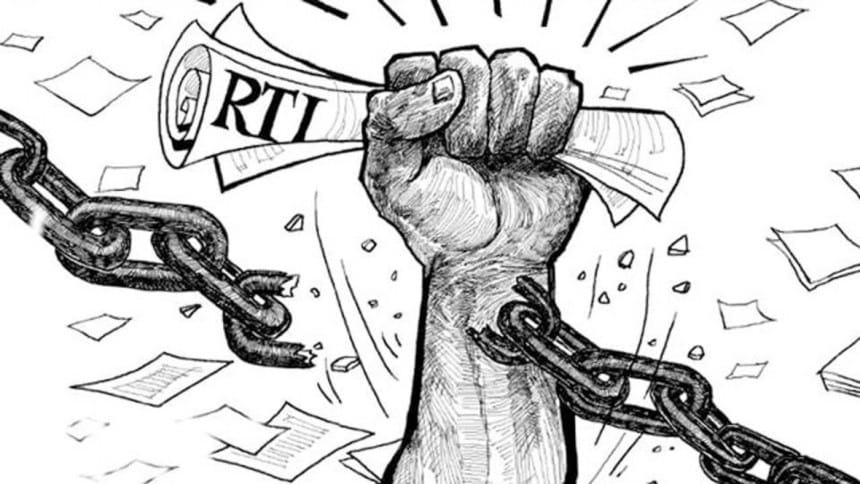Untold tales of RTI successes

Today, we present tales that have been gathered from ordinary Bangladeshis. In the absence of a common source of information recording all the right to information (RTI) requests in Bangladesh, we reached out to those who help people submit such requests. These are some of the stories that are inspirational and motivating.
Government office forced to resume work
Muminul Sarkar, an RTI activist from Rangpur, was vexed to find that the Statistics Office in Taraganj upazila remained closed most of the time. He took a picture of the locked office door and attached it with his RTI request, asking for the attendance record of the official concerned. Soon, he discovered that the office was, in fact, kept open regularly, and the official even invited Muminul to visit his office. Upon hearing the story of the sad situation of the official's personal life, which caused him to sometimes neglect his professional duties, Muminul expressed sympathy, but reminded the official that as a good citizen, it was his responsibility to point out this dereliction of duties.
UP financial irregularities out in the open
The same Muminul Sarkar of Rangpur came to know early this year that some grave financial irregularities had taken place at a union parishad under his upazila. He immediately submitted an RTI request to the secretary of the union parishad asking for the audit report of FY2017-18. Upon receiving said report, he found that auditors had highlighted different types of irregularities in their findings. However, no action had been taken by the authorities concerned in that regard. Mominul sent a follow-up RTI request to the secretary of the local government ministry asking for a response to the audit report. The ministry duly investigated the matter and found that the irregularities were related to projects amounting to a total of Tk 5 crore, out of which work worth Tk 3 crore has not been done at all, and only half of the work worth Tk 2 crore had been done. The ministry directive required those directly in charge of the projects to return the unspent money fully, and said that in the projects where only half of the work had been done, the secretary of the union parishad in question would have to cover the remaining cost.
BTRC compelled to update info in Bangla
Nowshad Hossain of Dinajpur was unhappy about some charges being levied by telephone companies from their users. He wanted to find out the actual rules in this regard from the website of Bangladesh Telecommunication Regulatory Commission (BTRC). To his dismay, he found that the information was uploaded in English only. So, he submitted an RTI request to the commission seeking the specific information on the charges, but also asking the reason why the information on the website was not available in Bangla as well. To his great delight, he discovered that in less than 10 days after his RTI request, the website was updated in both Bangla and English.
Unique ID registration by students becomes easy
A recent government decision to introduce unique identification cards for students has caused a great deal of consternation among both students and their parents. Digitalised birth registration is required for all students. In order to digitalise the students' birth registration, their parents' births have to be registered digitally first. Apart from the hassle of obtaining such documentation, this puts pressure on the servers, slowing them down immensely. This led Shahidul Islam of Fulbari upazila in Dinajpur district to submit an RTI request online to the education ministry, asking for the process to extend the deadline. Immediately upon receiving the request, the ministry reportedly extended the deadline and eased some of the provisions.
Committees to prevent sexual harassment in educational institutions
Hamidul Islam of Nawabganj upazila, Dinajpur submitted an RTI request to the Deputy Commissioner's office in Thakurgaon asking to know how many educational institutions in the district had set up committees to prevent sexual harassment at educational institutions, as required by a High Court directive issued a decade ago. In a prompt action, the DC office attached the RTI request with a forwarding letter to all upazila nirbahi officers (UNOs) asking them to ensure swift action by all educational institutions in the district. Hamidul was later pleased to learn that the required action was initiated in the entire district, albeit long after the High Court directive had been issued.
There are many such stories that warm our hearts and firm up our faith in the people to take the RTI regime forward. We understand that we must set our objectives higher to benefit from the larger goals of the law, but these stories indicate that a good foundation is being laid. We hope the media and other voices share such stories throughout the country on a regular basis, so that others are inspired.
Dr Shamsul Bari and Ruhi Naz are chairman and assistant director (RTI), respectively, of Research Initiatives, Bangladesh (RIB).

 For all latest news, follow The Daily Star's Google News channel.
For all latest news, follow The Daily Star's Google News channel. 



Comments